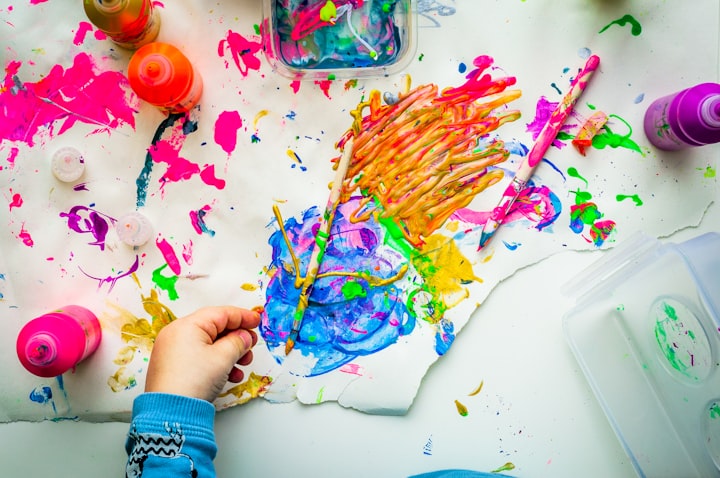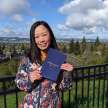Lessons and the Gifts of: Growing up with ADHD
Without knowing I have ADHD
Growing up with ADHD in a very traditional Asian culture without recognizing or admitting (shame) I have ADHD, is what prepared me to adapt and blaze through the unknown and obstacles in the ever-changing world, it also prompted me to reach enlightenment, the height of my career, and realized joy and appreciation for everyday being. The lesson I learned can benefit parents, teachers, and fellow ADHD learners out there.
In this day and age, ADHD is easily diagnosed, and has plenty of medications to alleviate the symptoms or keep our children focused. The gift, that I learned, is no medication can really cure the sense of disappointment, shame, and being lost that comes with ADHD. Let’s start with my childhood, and briefly talk about what ADHD is.

Attention Deficit/Hyperactivity Disorder – the name itself appears to be quite negative. Imagine having all of the symptoms in a rural fishing town in the 80s and 90s, in Taiwan. According to Taipei Times, “The decade saw the final years of martial law, media censorship, and political murders, as well as the beginnings of multi-party democracy.” Taipei Times also stated that “It was a chaotic milieu which blurred freedom and authoritarianism, and in its midst, arts and social movements exploded.”
What does that mean for me? It was quite confusing and later became traumatizing as a child with wide bandwidth that is always distracted by noises around; who grew up in a traditional southern family. And these bruises lingered and continued to grow up with me as I moved to the States in the early 2000s. It did not make things easier, for a teenager who was prone to emotions but did not know how to seek support, and who was seeking approvals and identities to no avail.
Let’s briefly talk about ADHD in a medical sense. According to CDC, “ADHD is one of the most common neurodevelopmental disorders of childhood.” “Children with ADHD may have trouble paying attention, controlling impulsive behaviors (may act without thinking about what the result will be), or be overly active.” Checked, checked, and checked. ADHD is classified into 3 types: Inattentive type, Hyperactive-Impulsive Type, and the Combination type. Checked, checked, and of course, checked.

The struggles existed for both sides: externally, my family (no faults to them, as this was how they were raised) holds very objective standards of what a person “should” behave and become; and, as CDC states: Having ADHD makes a child more likely to be diagnosed with Conduct Disorder.” Furthermore, Intrinsically, I am a free spirit at heart and an empath who dwelled on my parents’ tension on me and I perhaps really acted out even more. The mix did not go well for my parents raising me in a traditional culture, and it did not go well for me growing up wanting to be different from everyone else, and wanting to be treated the same as everyone else. All I can remember, my parents hated everything I did when I was growing up.
In 2003, at the age of 19, I packed my bag and left for the United States. I (and my parents) often wonder if I was running away. In 2013, I picked up a book called “The Gifts of ADHD” with heightened emotions, mostly fright – as I think I have ADHD but I was so afraid to call it. Why? In Taiwan, and I was sure it could be the case in any western world ADHD was labeled in a negative way just like depression and bipolar. We would never want to admit someone is an “over-active child.”

But the experiences were apparent. They wanted me to learn piano, I sat for 2 lessons and never went back, we proceeded to art, and I could not even sit through the first lesson. Though they did not say it, for someone that is hypersensitive to others' energy and emotions, all I can "hear" is “What a waste, why couldn’t you just be like a normal girl.” – I was not “normal”, and I was ok with that, the deep seeded self-esteem trauma was that “why not? why am I never good enough?” Then it came Taekwondo, I ran home with a brochure, and my father shook his head in disapproval and signed the form, I ran back to school to sign up and never looked back. I got my black belt second degree when I was 12 years old.
As far as school work, we did not realize it then, but I just now realized why I was so bad in math. But that is how it was categorized, “bad.” I was always ashamed that I was not able to excel in math and calculus, like my brother. So imagine the shame and pressure I had put on myself. According to CDC, “Many children with ADHD also have a learning disorder (LD).” “This is in addition to other symptoms of ADHD, such as difficulties paying attention, staying on task, or being organized, which can also keep a child from doing well in school.” And Dyscalculia (difficulty with math) is one of them.
However, the disability to pay attention, is actually the ability to absorb so much information all at once (hence not able to focus on one single thing) - the ability to capture all information (if they make sense) in my brain and file them away and the ability to conduct the “process of elimination” in tests helped me succeed in other school subjects.

I do pay attention, and my attention span is calibrated in such a high capacity that sometimes I couldn’t even catch my own last thought(s). The bad news is that I hardly finished what I started because the stimulation was lost and something more interesting came along, which is the biggest ADHD behavior, impulsiveness, and easy to distract. The good news is that if I did finish it, I knocked it out of the park. The drive for me to finish is multiple layers of stimulation, activities, and a slight obsession to get better to keep me moving.
Finally, CDC also states: “Children with ADHD are more likely than those without to develop an anxiety disorder.” And “Children with ADHD are more likely than children without ADHD to develop childhood depression.”

3 years ago, from the outside looking in, I had everything everyone ever wanted, a high-paying career that allowed me the time off to travel internationally for a month, twice a year, living in a mountain paradise that some can only dream of; played hard in the morning and worked in a fun environment at night. But I was so lost. I was so lost that I muttered “I cannot live like this” when I collapsed on the bathroom floor that fateful March evening. It felt like I had no way out – there was always a choice (materially,) but emotionally, I saw no other choices than suffering, pain, and finally vanishing. Years of shame, self-destructive thoughts, and behaviors, the guilt that resided in me since I was a child, the resentment, they all crept up on me and told me this was the only way to feel. The hardest part, of having ADHD for me, is the high probability of Emotional Dysregulation, as I am also not great at expressing how I really feel.
Eckhart Tolle says in his book “A New Earth” that oftentimes, enlightenment does not happen until the end of the suffering, that it is easier for those who have suffered deeply, to liberate that stored energy and find a new beginning. On the fateful March evening in 2020, I was on my way to liberation.

So what lessons have I learned from this liberating journey of growing up and living with ADHD? One, self-awareness is the key to maximizing one’s potential with ADHD. And the best way to practice self-awareness is through meditation & Journaling. Meditation is the gateway to shifting obsessive thoughts to open focus (shifting impulsive thinking/feeling loop to more regulated thought/behavior.) Being self-aware also allowed me to start creating tools to benefit me, and others. I was re-creating my life. Two, do not dwell on what you lack and focus on what makes you great. I chose a career in that being hyperactive is celebrated. Fast-paced, and ever-changing scenarios. I was not only quick on my feet; my brain just could not help but think 10 steps ahead of every possible chain of events. People with ADHD can pay attention to so many things at once, contrary to the old belief that we cannot pay attention. I was prone to scatter-brained (because I am paying attention to many projects), so I learned to double-check every detail and I created a very popular priority matrix (link included) among my colleagues. Lastly, I learned to be vulnerable and surround myself with people who understand (or are willing to understand) how I regulate my emotions. With that, I also learned how not to blame myself for something I may not have control over, but continuously work on how I can better maximize my potential.

Are you ready, to maximize your potential?







Comments
There are no comments for this story
Be the first to respond and start the conversation.